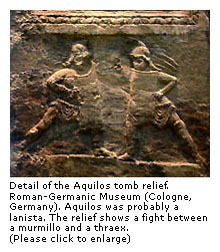Origines
Albeit the Emperor hosted the munera during the Imperial
period and paid them out of the treasury, they were held on
special occasions only, e.g., in the context of a triumph,
while the ludi (games), such as the ludi Romani,
ludi Plebeii etc., took place regularly during religious
festivities. They included chariot races in the circus, processions
as well as theater displays. Gladiatorial fights were never
a part of these ludi.
Who became a gladiator?
Originally prisoners of war were trained as gladiators in
the ludi (here: gladiator schools). The names of the oldest
gladiator types, such as thraex (Thracian), gallus
(Gaul) and samnis (Samnite), refer to the fact that
they used to be fighters of those tribes who fought with their
typical weapons.
When a specialization of the types set in, it was no longer
necessarily a Thracian who appeared in the arena as a thraex.
There were also slaves who were sold to a lanista (owner
of a ludus) by their master - later on this became
outlawed though - as well as criminals who were convicted
ad ludos (to gladiator school). Since gladiators were
as popular as our today's sports stars, there were also volunteers
- sometimes even of the senatorial class - who signed up at
a ludus.
We have to differentiate though between volunteers who just
received sword fighting lessons at a ludus and appeared only
at the prolusio (pre-fights) with blunt or wooden weapons
against a professional gladiator, and those who enlisted as
professional fighters. Members of the latter group were no
longer listed as property-owning, no longer allowed to hold
a public office and could not be called into military service.
However, they remained Roman citizens.
|
